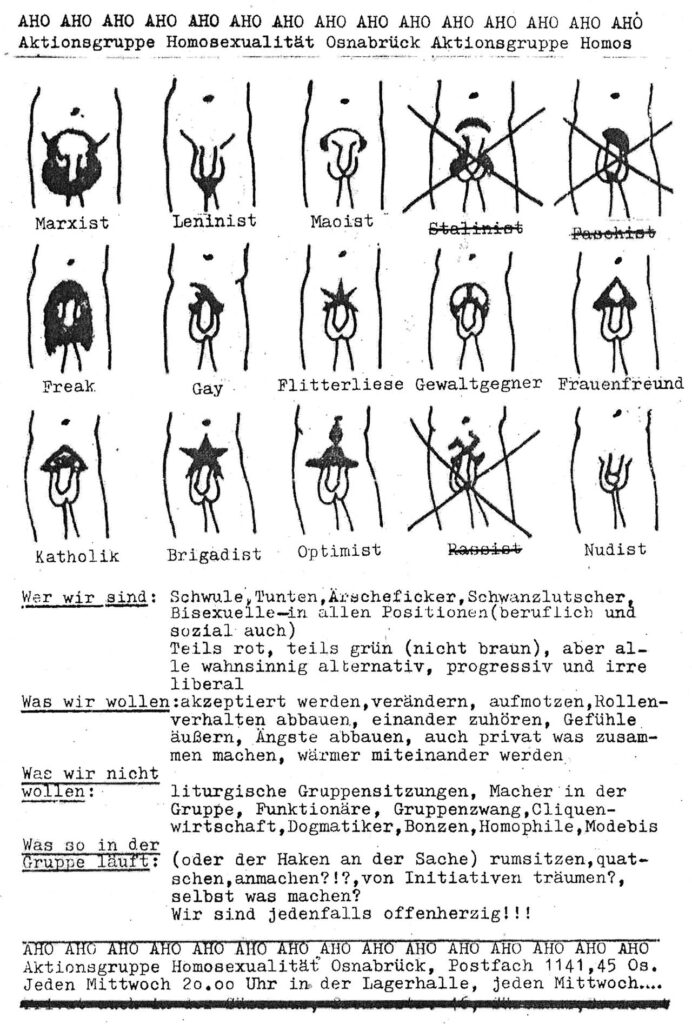Hauke Branding
How should a leftist style their pubic hair? The question might seem bizarre and frivolous, but to gay liberation activists in West Germany during the 1970s, it was anything but. When I accidentally came across this undated leaflet (most likely from 1977/78) by the Aktionsgruppe Homosexualität Osnabrück, AHO (Action Group Homosexuality Osnabrück), it struck me as a noteworthy and provocative example of how activists playfully approached gay politics of the time. The leaflet’s eye-catching and provocative illustration helped to draw attention to the group and define its membership as pluralist: “we are: gays, faggots, assfuckers, cocksuckers, bisexuals – in all positions (professionally as well as socially). Partly red, partly green (not brown), but immensely alternative, progressive, and fiercely liberal.”

Although they are crucial to understanding West Germany’s highly politicized gay liberation movement of the 1970s, the (remarkable) ways in which gay liberation groups in provincial or medium-sized cities positioned themselves politically are often overlooked. A small regional center of 150 000 inhabitants in Lower-Saxony, Osnabrück’s connectedness to its (predominantly conservative) hinterland led to specific crossovers of homosexualities in the city. Many activists grew up in the countryside or lived and worked there still, and marriages (sometimes with children) were anything but an exception. Consequently, homosexual action groups – a short-lived predecessor of AHO (1973-74) that was also a pluralist-leftist group – needed to genuinely consider this specific background among (potential) members, comrades, and companions. Activists needed to allow for different political currents and goals within the group – especially if they sought to attract new members.
The different pubic hairstyles (left to right: “Marxist, Leninist, Maoist, Stalinist, Fascist, Freak, Gay, Tramp, Opponent of Violence, Woman’s Friend, Catholic, Brigadiste, Optimist, Racist, Nudist”) playfully acknowledge the ongoing political debates of the radical gay liberation movement while gently mocking the stubbornness and narrow-mindedness often found in these debates. One could also read it as an implicit reference to the famous leaflet of the Socialist German Student’s Union (SDS) women’s council from 1968 in which they attacked male leaders of SDS for disregarding feminist issues and demanded to “free the socialist eminences from their bourgeois cocks!” Read in this way, AHO’s leaflet at once illustrates the group’s knowledge of current ‘political hairstyles’ and their acceptance of most of them—although certainly not all of them—while also highlighting that the group did not see a strict necessity to stick to only one specific ‘hairstyle’ (i.e. political identity).
Although in its aesthetic and tone the leaflet comes off as provocative and direct (without being too vulgar, of course), it also focuses on personal, everyday issues and displays some ambivalence regarding political objectives: “What we want: to be accepted, change things, speak up, reduce role behaviour, listen to each other, express feelings, reduce fears, spend time together privately, get warmer with one another”. Given its mostly leftist references, one might have expected the group to formulate more direct political demands. Instead, it focuses on questions of the everyday. Together with the affectionate invitation at the bottom — “We are open-hearted in any way!!!” — the leaflet indicates the group’s openness to different personal and political needs and experiences as well as strategic considerations for attracting members and operate politically in a city such as Osnabrück.
Leaflets like the one from AHO reveal how gay liberation groups in smaller cities worked within their specific contexts while operating within the movement’s general debates and references. Narratives of conservative dominance and political backwardness of more rural areas in gay liberation aside, the playfulness and irony of AHO’s leaflet remind us of the importance they placed in joy and desire as part of their political activism.
 Hauke Branding is a research associate at Leuphana University in Lüneburg, Germany, investigating radical West German gay liberation movement as part of the research training group “Cultures of Critique”. In 2019, he co-edited a new German edition of Guy Hocquenghem’s Homosexual Desire together with Lukas Betzler.
Hauke Branding is a research associate at Leuphana University in Lüneburg, Germany, investigating radical West German gay liberation movement as part of the research training group “Cultures of Critique”. In 2019, he co-edited a new German edition of Guy Hocquenghem’s Homosexual Desire together with Lukas Betzler.

NOTCHES: (re)marks on the history of sexuality is licensed under a Creative Commons Attribution-NonCommercial-NoDerivatives 4.0 International License.
Based on a work at www.notchesblog.com.
For permission to publish any NOTCHES post in whole or in part please contact the editors at NotchesBlog@gmail.com





Fab! Not aware of any similar examples.